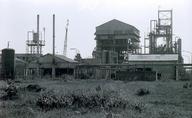Subject

photo credits: Wikimedia Commons
The Bhopal disaster or Bhopal gas tragedy was a chemical accident on the night of 2–3 December 1984 at the Union Carbide India Limited (UCIL) pesticide plant in Bhopal, Madhya Pradesh, India. Considered the world's worst industrial disaster, over 500,000 people in the small towns around the plant were exposed to the highly toxic gas methyl isocyanate (MIC). Estimates vary on the death toll, with the official number of immediate deaths being 2,259. In 2008, the Government of Madhya Pradesh paid compensation to the family members of 3,787 victims killed in the gas release, and to 574,366 injured victims. A government affidavit in 2006 stated that the leak caused 558,125 injuries, including 38,478 temporary partial injuries and approximately 3,900 severely and permanently disabling injuries. Others estimate that 8,000 died within two weeks, and another 8,000 or more have since died from gas-related diseases.The owner of the factory, UCIL, was majority owned by the Union Carbide Corporation (UCC) of the United States, with Indian government-controlled banks and the Indian public holding a 49.1 percent stake. In 1989, UCC paid $470 million (equivalent to $970 million in 2022) to settle litigation stemming from the disaster. In 1994, UCC sold its stake in UCIL to Eveready Industries India Limited (EIIL), which subsequently merged with McLeod Russel (India) Ltd. Eveready ended clean-up on the site in 1998, when it terminated its 99-year lease and turned over control of the site to the state government of Madhya Pradesh. Dow Chemical Company purchased UCC in 2001, seventeen years after the disaster. Civil and criminal cases filed in the United States against UCC and Warren Anderson, chief executive officer of the UCC at the time of the disaster, were dismissed and redirected to Indian courts on multiple occasions between 1986 and 2012, as the US courts focused on UCIL being a standalone entity of India. Civil and criminal cases were also filed in the District Court of Bhopal, India, involving UCC, UCIL, and Anderson. In June 2010, seven Indian nationals who were UCIL employees in 1984, including the former UCIL chairman Keshub Mahindra, were convicted in Bhopal of causing death by negligence and sentenced to two years' imprisonment and a fine of about $2,000 each, the maximum punishment allowed by Indian law. All were released on bail shortly after the verdict. An eighth former employee was also convicted, but died before the judgement was passed. Source: Wikipedia (en)
Works about Bhopal disaster 2
Subject - wd:Q129029

